#classical leninism
Explore tagged Tumblr posts
Text
Visited an op shop I hadn't been to before (because it was in a slightly awkward place) and discovered it has a fantastic non fiction section. I could have walked out with so many chunky history books but I had to restrict myself to being able to carry them out.
#decentish classics/lit section too#a range and in nice editions that weren't horrible beaten up#regretting not getting a couple of the chunkier hardbacks#there was the julia baird bio of queen victoria#and one of the russian revolution#(i'm reading about lenin at the moment bc i honestly do not know enough about that era or russia)#i need to go back already
8 notes
·
View notes
Text
Review: The Master and Margarita - by Mikhail Bulgakov
I read a lot of Russian literature and am becoming a bit of an aficionado. This book was first recommended to me by an ex-girlfriend from Serbia and it’s taken me a while to actually get around to completing it but I finally have done so and can produce this review. Bulgakov is a twentieth century author of Russian fiction and lived during the heady epoch of Communism with its quite harsh…
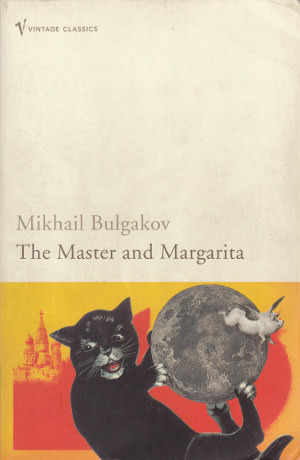
View On WordPress
#Azazello#Behemoth#Bolsheviks#censorship#Christ#classic#communism#communist#crucifixion#death#demonic#demons#devil#dissidents#hell#Jesus Christ#Jewish#Koroviev#Lenin#Margarita#Master#Master and Margarita#Mikhail Bulgakov#Moscow#Palestine#Pontius Pilatae#Procurator#puragtory#russia#Russian Literature
2 notes
·
View notes
Text

#socialist albania#socialist realism#albania#karl marx#communism#internationalist communism#four classics#marxism leninism
0 notes
Text
People really love to cynically abuse that whole "old dead white men" line don't they. Like there is a very genuine issue with how various systems of oppression (racism, misogyny etc.) mean that thinkers from privileged backgrounds got a disproportionate amount of attention and praise compared to those from a more marginalised position, with the theoretically contributions of the latter getting frequently mis-attributed or outright ignored. It doesn't mean that the contributions from said privileged thinkers are all inherently worthless on that basis alone.
Like it's a classic example of the way that liberals take structural critiques and turn them into a matter of personal morality. "Overrepresentation of privileged thinkers is bad" gets turned into "Privileged thinkers are all bad people". And it always gets used in the most cynical way possible. You hardly ever see this line used on thorough reactionaries like Nietzsche. It's mainly used to denounce progressive thinkers who, whatever flaws they had and bigotries they were unable to escape, still made innumerable contributions to the causes of liberation and laid the groundwork that was later developed and expanded by marginalised theoreticians. Like people should definitely read more Ho Chi Minh and Amilcar Cabral and Angela Davis, but that doesn't diminish the value of Marx and Lenin.
As important as it is to remind people of the contributions that marginalised people all over the world have made to Marxism (if only because even many Marxists themselves fail to appreciate this*), using it counter the whole "dead white guys" gotcha misses the point of why it's such a stupid thing to say. Because that line is a critique of a system, and it loses all power and meaning when removed from that context applied on the level of individuals. Bigotry is a dialectical structure and not a metaphysical condition; possessing privilege matters in terms of interaction with the broader world not as an ontological fact of your existence. Individuals do matter to some extent, but mainly in terms of how they fit into broader systems and not how systems fit around individuals. You need to realise all this if you want to get anywhere. This individualist bullshit only works as a tool for personal gratification and flagellation; it's masturbatory in the worst possible way
*even if you consciously support an ideology of anti-bigotry, it takes discipline and vigilance to properly unlearn all the biases instilled by life under Imperialist Capitalism and not everyone is successful at applying this
894 notes
·
View notes
Text
Precisely. Imperialism was already a word with an agreed upon definition when Marx and then Lenin started using it. Lenin, in particular was keen to redefine imperialism as something only capitalists did, because he started engaging in what was a clear cut case of imperialism almost as soon as he took over Russia. Imperialism at the time was hardly seen as universally bad, but it was seen nearly universally as bad on the international left. So Lenin had a problem. He had to reframe Soviet imperialism as something else.
What he settled on was that, oh no only capitalist powers engage in imperialism. What we're doing, why that's spreading the international worker's revolution. If you resist, that makes you a counter-revolutionary, and we all know how counter-revolutionaries are to be dealt with.
This has become a central tenet of the people we have come to call tankies, i.e., authoritarian leftists like our friend sublime-linguist up there, ever since.
It's only imperialism if it comes from the imperialist region of Western Europe. Otherwise, it's just sparkling subjugation.
#a s fischer added#It's a classic case of morality being decided by who is doing an action and not what the action is#it's not bad when we do it you see#My political science degree and I are both deeply insulted by the implication that I did not read Lenin
505 notes
·
View notes
Text
(limited to Europe because there are limited slots per poll)
*The Long 19th century is the period between the French Revolution and the The First World War.
The French Revolution: The original, the classic. It's got Robespierre and Marat and a Guillotine.
The Serbian Revolution: Resisting Ottoman Rule? Forming a new state? Creating a Constitution? Serbia kicked it off in the Balkans nevermind that it took three tries and three decades.
The Greek Revolution: Have you become hopelessly invested in the idea of Greece as the cradle of civilization? Do you want to die fighting for it in a way that is tragic and romantic? Then you might be Lord Byron.
The Carbonari Uprisings: Secret societies are more your speed? Here is one in Italy doing their best to try to make liberal reform happen.
The Decembrist Revolt: So, a bunch of officers came back from Napoleonic Europe wanting to see constitutional change and possibly the abolition of serfdom. Sounds reasonable, right? Right??
The July Revolution: Can you hear the people sing? You know the one, barricades and the most iconic painting in French history. Louis Philippe ends up on the throne and he is....sexy to someone.
The November Uprising: Congress Poland decides that they are sick of the tsar. Poland undertakes a tragically doomed struggle against Russia.
The Belgian Revolution: The Belgians decide to file for divorce from The United Netherlands. Leopold of Saxe-Coburg ends up on the throne and he's sexy.
The 1848 Revolutions: The Springtime of the People! Revolutions everywhere: France, Hungary, Poland, Austria, The Italian and German States.
The January Uprising: The third time is the charm on kicking out the tsar and making a Polish state, right?
The Paris Commune: Napoleon III abdicates and leaves after being thumped by the Prussians. For two months, a communist people's regime rules Paris.
The Russian Revolution of 1905: This is not the one with Lenin yet! This is the one that forces Nicky to create a Duma. Some consider it the dress rehearsal for what would come next.
#napoleonic sexyman tournament#we need a new tag for extra polls#this is why people like the 19th century by the way#look at all those revolutions
201 notes
·
View notes
Text
I've seen Ta-Nehisi Coates touted as an authority for years, and I honestly never looked into his background.
As he has all the attention of Jumblr and the Jewish community right now, I decided to actually do a cursory look.
Bruh.
Someone who is touted and lauded as a great expert and authority by the Left actually has no credentials whatsoever?! He went to Howard for 5 years and then dropped out to start his journalism career.
Coates states that "Howard trained him intellectually" and just.. no. No it did not.
You didn't finish an undergrad degree my guy. That's barely giving you any training in intellectual thinking and rigor.
It honestly appears that Coates has been given an "authority" pass because he is speaking as a Black Man on Black history and Black issues that currently effect or have effected Black people.
But now?
Now he's taken that "authority" and is using it to speak on issues that he has no relation to beyond traveling to the area for a small amount of time in 2023. He has no understanding, relationship, or education on anything relating to Israel, Palestine, or the Levant. It's reminiscent of Nobel Disease, where an well regard authority in one subject matter starts talking out their ass about something else (e.g. Linus Pauling and vitamin C).
Now, some of you are going to attack me for this because something something privilege and academia and I'm talking about someone who is arguable well regarded. But I'm sorry, dropping out after 5 years to pursue your career, not even have the credentials for said career, and now take that uncredentialed pseudo-expertise and apply it to something you have no relationship to at all?
That's just asinine.
I honestly think this tweet by Montefiore sums it up nicely.

Let's also not forget that Ta Nehisi Coates was taught by his father, Paul Coates, to be antisemitic and literally view this entire situation through America's Issues. Paul Coates was a member of the Black Panthers, which for all the good they did do and have done you also have to remember that antisemitism is baked into the group. The BPP was influenced by the Nation of Islam and Marxism-Leninism and Mao, so they were literally influenced by some of the most antisemitic organizations, groups, people, and rhetoric in the 20th Century outside of Nazis. This means that Ta Nehisi Coates likely grew up with antisemitic rhetoric and conspiracy being prevalent and accepted throughout his life. For example, take this excerpt from his book The Message:

Now also consider that his father's publishing company was also caught republishing an extremely antisemitic book that spreads conspiracy, hate, and misinformation.
So yeah.
Sorry folks.
But Ta Nehisi Coates is just spouting NOI and Tankie antisemitic conspiracy and rhetoric wrapped in progressive pseudo-academic professional language.
#jumblr#antisemitism#leftist antisemitism#pseudo expertise#Intellectual dishonesty#Pseudo academic#ta nehisi coates
225 notes
·
View notes
Text
Russian State Library
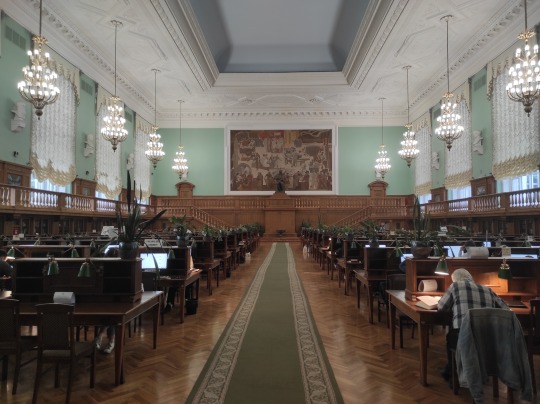
The biggest library in Russia and one of the biggest in the world. It was designed in late 1920s, soon after the birth of the new Soviet state, and fully finished in the 1950s. In includes 4 buildings and one 19-floor book repository. There are several reading halls, a cafe, and a whole bunch of book-filled nooks and crannies.
I'm writing this post sitting in the library's biggest reading hall - Reading Hall No. 3. It was opened in 1957 and still retains most of the original furniture and design (only there are now individual power sockets in every desk). Most of the tables are occupied by people with books and laptops. It's very quiet.

The book depository is a huge building that rises high above everything else in this historical area. It had 10 floors originally, each 5m high, but later it was divided into 19 smaller floors. We visited one of the floors. I was impressed to see that the windows are made out of Falconnier glass blocks (made specially for the library in Gus Khrustalny).
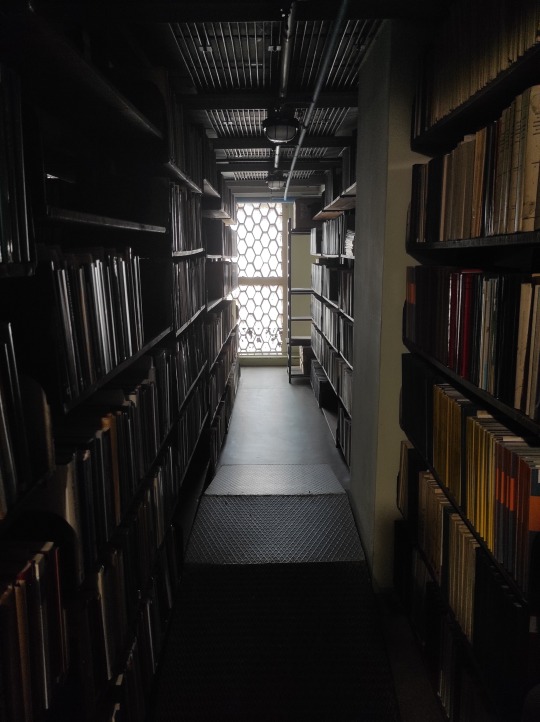


There are two automated delivery systems in the library: one delivers readers' orders into the depository (pneumatic tubes) and the other delivers books back to the reader (monorail). We had a chance to see both of them in action, very impressive! They also kept a bit of the old book delivery system that worked from 1953 until 2015. I saw it on pictures before, and it was great to see the granny in real life. :) There are a lot of "grannies" in the library, from the green lamps to rotary phones to wall clocks. The pneumatic tube system has been in place since 1975. People whose job is to preserve books are very likely to preserve everything else.




I loved this anecdote. In one of the reading halls, there's a big painting of Lenin (pictured below). Apparently it was put in place in mid-1950s to cover the bas-relief that was there originally. On the bas-relief there are Karl Marx, Friedrich Engels, Vladimir Lenin and Joseph Stalin. After Stalin's death in 1953 and debunking the cult of personality, images of him were quickly removed from everywhere. The library, being true preservers of history, kept theirs but covered it up. It just shows what kind of people librarians are. :)
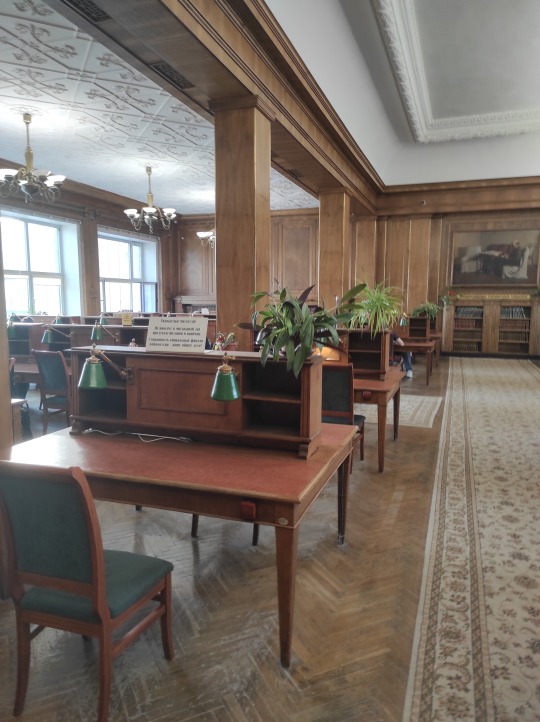
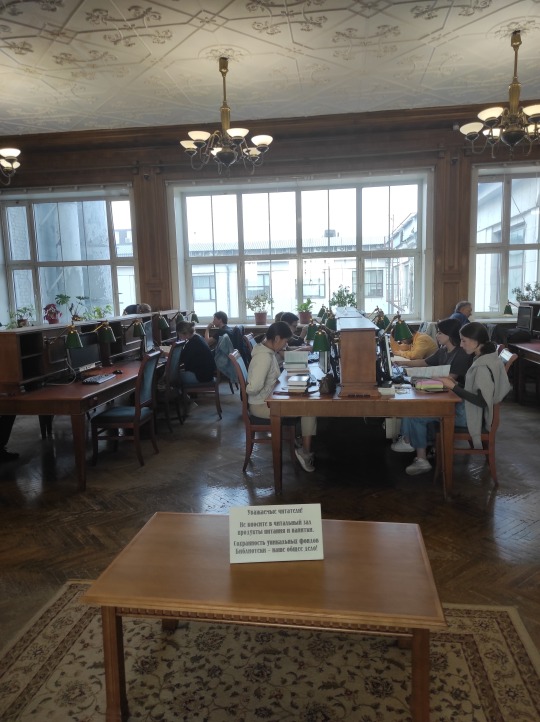
Although the library is working on running a full digital catalogue of all their 48 million items, if you want access to older editions you'll probably need to use the old paper card catalogue. The room gave me major nostalgy - I remember using this kind of catalogue in my local library when I was a kid. The sound of pulling out a narrow box, then the little built-in table, going through the cards one by one, writing down what you need on library cards. It was a whole process! Of course, the local library's catalogue was WAY smaller.
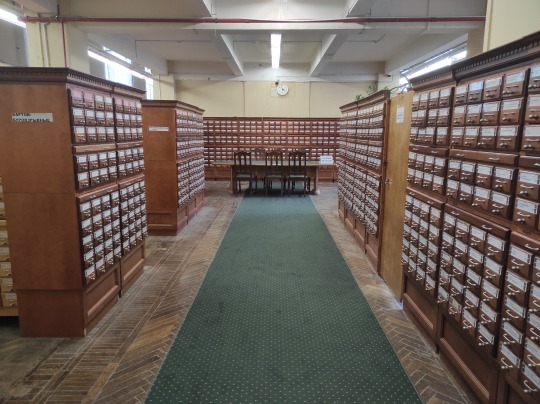



A few more shots of interiors. Although the building itself was designed in 1920s (during the era of avantgarde and art deco), the interiors were mostly done in 1950s when the main design style was neo classicism.

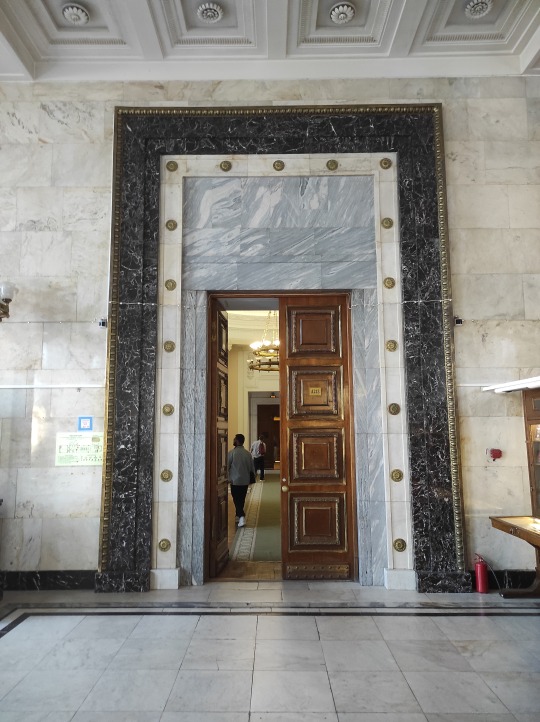


I enjoyed this tour immensely, so much so that I had to go back and get a library card so I can see more of it, sit in every reading hall and drink a cup of tea in the marble hall cafeteria. Also, the idea of 48 million books at the tip of my fingers makes me giddy. Thank you to my followers for the monetary support and making this real for me: K. T., H. W., T. B., m., @depetium, @transarkadydzyubin, S. R.
760 notes
·
View notes
Text
World War III and the Fall of Imperialism
A speech by Booker Ngesa Omole, The National Vice Chairperson of the Communist Party of Kenya
As we gather here at the 7th International Conference of the World Anti-Imperialist Platform, we stand at a critical juncture in our shared struggle against the scourge of imperialism. Today, I want to discuss a stark reality that looms over our world: the inevitability of World War III, driven by the unrelenting aggression of imperialist powers. This war is not a distant possibility but a present danger, rooted in the insatiable greed of monopoly capital.
Imperialism, in its various manifestations, poses an existential threat to the sovereignty of African nations. Initiatives such as AFRICOM serve as instruments of this imperialist agenda, undermining our autonomy and reducing our countries to mere pawns in the geopolitical chess game orchestrated by Western powers. These military strategies are designed not to protect our people but to secure the interests of the imperialist elite.
In Kenya alone, we host three foreign military bases, a glaring testament to the erosion of our sovereignty. These bases are not just symbols of military presence; they represent a direct violation of our independence and dignity. They subjugate our military and intelligence agencies to the whims of U.S. imperialism, turning our institutions into extensions of foreign powers. This scenario is replicated across the continent, where foreign military presence is a common thread in the tapestry of imperialist domination.
The spectre of World War III is already haunting us, as conflicts rage on multiple fronts. In West Asia, the struggle against Zionist aggression is an anti-imperialist, antifascist war. In Eastern Europe, we witness the brutal realities of NATO-backed conflict in Ukraine. And in East Asia, tensions simmer around Taiwan and the Korean Peninsula, echoing the same imperialist ambitions.
Lenin, in his classic work “Imperialism: The Highest Stage of Capitalism,” eloquently articulated the dynamics of imperialism and its inevitable contradictions. He described how imperialism seeks to escape internal crises through external wars. Today, we observe this in the provocations and military exercises conducted by the United States and its allies, which serve not just as a show of force but as desperate attempts to maintain their declining hegemony.
Yet, amidst this chaos, the anti-imperialist camp is rising, united in its struggle against oppression. Comrades in Russia, China, the Democratic People’s Republic of Korea, Iran, and various resistance movements across the Global South are not seeking war; they are prepared for a just struggle against imperialist aggression. The unity and operational strength of the anti-imperialist front underscore a powerful truth: we are not alone in this fight.
The reliance of imperialism on proxy wars and economic sanctions reveals its strategic limitations. The imperialist powers fear direct confrontation, knowing the consequences of nuclear escalation. This hesitation will be their downfall. While they aim to exhaust nations like Russia, China, and Iran, we can turn their war of attrition into decisive victories across multiple theatres of conflict. These victories will not only weaken imperialism militarily but will also trigger a political and economic collapse. The fragmentation of NATO, the decline of the U.S. dollar’s hegemony, and the emergence of BRICS and other alternative institutions signal the end of the US imperialist order.
The eventual defeat of US imperialism will pave the way for a new global order defined by national liberation revolutions and the defeat of all neo-colonial projects across Africa, Asia, and Latin America. This new order will also see the inevitable resurgence of socialist revolutions and the establishment of people’s democracies. Additionally, there will be a true commitment to peace, independence, and self-determination as guiding principles for global governance.
As we face the challenges of our time, let us reaffirm our commitment to the struggle against imperialism. The victory belongs to the people. The end of imperialism will not only reshape global politics but empower nations to pursue socialism, democracy, and peaceful coexistence.
In conclusion, as we confront the spectre of World War III, let us remember that this is a final confrontation between the forces of imperialism and those of anti-imperialist resistance. Together, we shall emerge victorious, heralding a new era of hope, freedom, and progress for all.
Death to Imperialism!
Long live International Socialism!
72 notes
·
View notes
Text
Secondly, it is obviously wrong. It is natural for a liberal to speak of “democracy” in general; but a Marxist will never forget to ask: “for what class?” Everyone knows, for instance (and Kautsky the “historian” knows it too), that rebellions, or even strong ferment, among the slaves in ancient times at once revealed the fact that the ancient state was essentially a dictatorship of the slave owners. Did this dictatorship abolish democracy among, and for, the slaveowners? Everybody knows that it did not.
Kautsky the “Marxist” made this monstrously absurd and untrue statement because he “forgot“ the class struggle. . . .
To transform Kautsky’s liberal and false assertion into a Marxist and true one, one must say: dictatorship does not necessarily mean the abolition of democracy for the class that exercises the dictatorship over other classes; but it does mean the abolition (or very material restriction, which is also a form of abolition) of democracy for the class over which, or against which, the dictatorship is exercised.
But, however true this assertion may be, it does not give a definition of dictatorship.
Let us examine Kautsky’s next sentence:
“. . . But, of course, taken literally, this word also means the undivided rule of a single person unrestricted by any laws. . . .”
Like a blind puppy sniffing at random first in one direction and then in another, Kautsky accidentally stumbled upon one true idea (namely, that dictatorship is rule unrestricted by any laws), nevertheless, he failed to give a definition of dictatorship, and, moreover, he made an obvious historical blunder, namely, that dictatorship means the rule of a single person. This is even grammatically incorrect, since dictatorship may also be exercised by a handful of persons, or by an oligarchy, or by a class, etc.
Kautsky then goes on to point out the difference between dictatorship and despotism, but, although what he says is obviously incorrect, we shall not dwell upon it, as it is wholly irrelevant to the question that interests us. Everyone knows Kautsky’s inclination to turn from the twentieth century to the eighteenth, and from the eighteenth century to classical antiquity, and we hope that the German proletariat, after it has attained its dictatorship, will bear this inclination of his in mind and appoint him, say, teacher of ancient history at some Gymnasium. To try to evade a definition of the dictatorship of the proletariat by philosophising about despotism is either crass stupidity or very clumsy trickery.
As a result, we find that, having undertaken to discuss the dictatorship, Kautsky rattled off a great deal of manifest lies, but has given no definition! Yet, instead of relying on his mental faculties he could have used his memory to extract from “pigeon-holes” all those instances in which Marx speaks of dictatorship. Had he done so, he would certainly have arrived either at the following definition or at one in substance coinciding with it:
Dictatorship is rule based directly upon force and unrestricted by any laws.
The revolutionary dictatorship of the proletariat is rule won and maintained by the use of violence by the proletariat against the bourgeoisie, rule that is unrestricted by any laws.
Vladimir Lenin, The Proletarian Revolution and the Renegade Kautsky
52 notes
·
View notes
Text
since i got such lovely recommendations, here are some, if you are trying to get into brazilian music/learn more portuguese, they're mostly bossa nova/mpb/alternative rock
lenine - martelo bigorna, candeeiro encantando, jack soul brasileiro, o silêncio das estrelas (one of the best songs ever made imo)
criolo - não existe amor em sp
geraldo vandré - pra não dizer que não falei das flores (amazing and beautiful song, it was written during the brazilian military dictatorship, so check out the lyrics)
cartola - preciso me encontrar (a classic)
chico buarque - cálice (a classic as well, also written during the brazilian military dictatorship, the word calice is an analogy to the word cale-se, or shut up, that was how they were able to release this song without going arrested)
renato russo - mais uma vez (legião urbana's lead singer solo project)
vanessa da mata - boa sorte/good luck, amado
supercombo - ela, memorial, aos poucos (alternative rock!!)
bella e o olmo da bruxa - neon genesis evangelion (alternative rock sprinkled with a little brazilian surfer rock)
pitty - teto de vidro (alternative emo rock)
banda do mar - mais ninguém (amazing song, dont look up the story of the band tho haha)
119 notes
·
View notes
Note
Do you have any good reading recs for a socialist-curious, but relatively uninformed liberal? Something approachable and beginner friendly? I've found what little I've read of "the classics" (Marx, Lenin) to be steeped in a lot of historical context that I don't understand, so I'd love to get started with something more modern. Thank you!
It's hard for me to give recommendations of that nature, because what is more approachable to one person might be even more dense to another. I will say that there's no shame in looking up the terms and references made by earlier authors; I do this frequently myself. But even more helpful than that is to find people or groups who you can discuss these works with and study together.
Here is the reading list I always link to as a general scattershot rec list, it includes both modern and older works:
I will also say that if anyone else wants to suggest particular works, please feel free to leave your recommendations in the notes!
26 notes
·
View notes
Text
28 notes
·
View notes
Text
People who use "Bourgeois Decadence" in a moralist way are so fucking funny. Like when Lenin talked about "Decadence" it was in terms of material decline; falling economic performance and inability to meet people's needs. It has nothing to do with individualist moral degeneracy. To take an example from classical history there's a massive difference between "Roman Decadence" in terms of excessive concentration of private wealth amongst the highest levels of aristocracy, punishing tax burdens on what's left of the free peasantry and subsequent lack of money and manpower to maintain state apparatus VS "Roman Decadence" in terms of they had to much sex and free bread and so become too weak and effeminate to fight back against the hyper-masculine barbarian hordes.
Like it takes an incredibly idealist thought process to conflate these two very distinct uses of the word. Anyone who does so renders everything else they have to say suspicious at best and outright worthless at worst. Like this sort of idealist moralism embodies Bourgeois Ideology much more than whatever "decadent" behaviour they wish to criticise. It's peak revisionism
270 notes
·
View notes
Note
What do you think of this excerpt?
https://www.tumblr.com/beguines/755310368521355264/what-the-theory-of-labour-aristocracy-tells-us
What [the theory of labour aristocracy] tells us is that there is not a monolithic working class and that achieving working-class unity is not merely a matter of getting beyond ruling-class maneuvers of "splitting" workers. Workers are not split because of an ideological conspiracy; they are split according to numerous structures that are built into the operations of global capitalism. Workers who experience a higher standard of living because of imperialist exploitation are materially invested in keeping this higher standard of living, just as a faction of workers who experience better working conditions because of race or gender or ability are materially invested in keeping these working conditions at the expense of those workers whose marginalization prevent them from getting the same jobs. Hence, if we follow the line of reasoning behind this theory, we will arrive at a notion of class that resists class essentialism. That is, to assert that there is a labour aristocracy, and that some workers who benefit from the exploitation of other workers are embourgeoisified, is to also assert that simply being a member of the working class is not enough to be, at root, akin to the proletariat of classical Marxist literature. Some members of the working class do not have "nothing left to lose but their changes," [sic] which means that being a worker does not mean having an inner revolutionary essence.
J. Moufawad-Paul, Politics in Command: A Taxonomy of Economism
While the reasoning is very agreeable and pretty uncontroversial among the people who find value in the concept of labor aristocracy (although the I think the mention of class essentialism is unnecessary), I find the conclusion a little bit exaggerated. It is true that workers of the imperial core benefit, (almost always indirectly), from the looting of imperialism. It is therefore in their immediate material interests to support imperialism. But regardless of how relevant the divide between workers on both sides of the imperialist system is, the relations that define it don't operate in a dissimilar way to other axes of privilege/oppression, such as misogyny or racism, and the author also shares this perspective, he uses the same in this excerpt. So I think it is a misstep to claim that «being a worker does not mean having an inner revolutionary essence», on two counts:
First, the set of privileges afforded to certain categories of workers does not make them less revolutionary, but rather tends to place the workers who suffer from more axes of oppression at the forefront of revolutionary struggle, exhorted by their generally worse material conditions and greater sensibility towards all kinds of oppression, such as class. Russian women were at the frontlines of both the February and October revolution, often among the very first to stress the necessity of a second revolution after the February bourgeois government revealed their inability to meet the workers' demands. In India, it was the workers at the lowest castes who often set an example in revolutionary consciousness, and it was the analysis of the caste system that developed the CPI in the years of stagnation following the intervention in Hungary.
Second, I think the author has misunderstood two elements of «classical Marxist literature». First, there is not a concept of «revolutionary essence» to be found in Marx's writings. If he has ever written such words, it's most probable he uses it more as a rethorical device or flourish rather than an actual argument of the existence of an «essence». The revolutionary potential of the working class springs from its objective relationship to the property of the means of production. There is no proletarian, platonic essence to speak of. Then, I think the author should also brush up on the two kinds of consciousness Lenin describes in What Is to be Done: economic-spontaneous consciousness and political-revolutionary consciousness. The first kind arises naturally from the worker's own experience with class antagonism, the kind manifested with non-revolutionary trade unions. The second arises from both a political education and an active participation in the class struggle within a revolutionary Communist Party.
Only that first kind of spontaneous consciousness is very vulnerable to the material benefits afforded by imperialism, and a proper education and construction of political-revolutionary consciousness will place any imperial core worker in anti-imperialist positions. The problem the author describes is real, don't get me wrong, but it's a problem that has been thoroughly described and solved more than a hundred years ago. We can debate about the degree to which imperialism makes this education difficult nowadays, but this main thesis the author expresses is wrong, or at least founded in opposition to a problem that is not relevant.
#ask#anon#seriousposting#author is a Canadian maoist so I think these mistakes line up with what you'd expect from a Canadian maoist
26 notes
·
View notes
Text
In academic historical leftist circles, there’s a temptation to endlessly replay the chess moves of classical revolutionary periods—the Comintern, the CCP’s alignment with the Nationalists, the decisions of the German Republic during the early Weimar years. In The Deluge, I indulged in that historical game myself. In the historical reenactment I played out the role of a hard-nosed, Keynesian, left-liberal unafraid to accept responsibility for violence. I regret that I indulged in that historical time warp myself. Not because I adopted a position different from that approved of by Anderson, but because I indulged in the game at all, and thus opened the door to his critique. I allowed myself to slide out of the more urgent domain of the present into the time-warped present of the academic ivory tower, in which now is 1924 and 1924 is now. I allowed myself to be sucked into an unproductive argument about a history that is no longer ours. This, I have come to feel, is a kind of escapism. If we were in a revolutionary moment that would be one thing. But we are absolutely not. So, very little is gained for understanding present-day politics by engaging in a historical Disneyland where we cosplay as Lenin, Trotsky, Wilson, imagining who we would have been and what we would have done. That’s playing at history. It’s the kind of boyish stuff people play on computers. We need to grow up. There’s too much at stake in the world right now. Things are too urgent. We need to be in the present, as best we can, fully engaged in medias res.
Adam Tooze, "On Thinking in media res"
11 notes
·
View notes